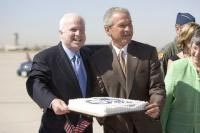Read Dan Froomkin [emphasis added]:
White House spokesman Trent Duffy said this yesterday: “I hope people don’t draw conclusions from the president getting a single briefing. He received multiple briefings from multiple officials, and he was completely engaged at all times.”
But where, then, is the first-hand evidence of this engagement? Where is the evidence of Bush’s leadership?
The government’s response to Hurricane Katrina was (and continues to be) a massive failure. The new videotape offers a visceral illustration of how some, if not a lot of the blame, lay in a leader who saw his job as expressing unjustified confidence and making empty promises, rather than taking action to make sure his people were safe.
Hurricane Katrina (as I wrote as early as Aug. 31 ) was the second great challenge of Bush’s presidency.
Which inevitably makes me think of how Bush responded, in a moment also “caught on tape,” to his first. After finding out that the nation was under attack on the morning of Sept. 11, 2001, Bush remained frozen in his seat in a Florida classroom for seven minutes.
The grainy video from that classroom, a hallmark of Michael Moore’s “Fahrenheit 9/11,” can be found at The Memory Hole.
A staff report from the 9/11 commission described that morning:
“The President was seated in a classroom of second graders when, at approximately 9:05, Andrew Card whispered to him: ‘A second plane hit the second tower. America is under attack.’ The President told us his instinct was to project calm, not to have the country see an excited reaction at a moment of crisis.”
But even after he left the classroom, he didn’t call the Pentagon. He didn’t ask if there were other aircraft hijacked or missing. Instead, he and his staff worked on a statement to the press.
Faced with challenges like these — an attack on our nation or a natural disaster bearing down on our shores — we can reasonably expect that our presidents will stand up, demand answers and options, and lead.
If the White House insists that Bush did that with Hurricane Katrina, it is incumbent upon them to back up that claim up with evidence. Otherwise, the image of him mouthing platitudes threatens to become defining of his presidency.
Tuesday night, ABC News’ Elizabeth Vargas asked the President about the administration’s response to Katrina, and the failures of the Homeland Security Department, an institution the president opposed until it became politically impossible to do so. The President admitted, “There was no situational awareness, and that means that we weren’t getting good, solid information from people who were on the ground…in many cases we were relying upon the media, who happened to have better situational awareness than the government.â€
Viewers must have been confused. Was that supposed to be an excuse or an explanation? How in the world was such a failure possible four years after 9/11? The President even offered DHS head Michael Chertoff his own “Brownie†moment during the interview, saying that he thinks he’s “doing a fine jobâ€. Given the President’s assessment of Michael Brown’s job in New Orleans and the Congressional Medals of Honor be bestowed on Paul “Pace Yourself†Bremer and George “Slam Dunk†Tenet – one can only imagine what it takes to demonstrate genuine incompetence in this administration.
And the moral is, strutting around in a flight suit is not “leadership.” I think finally most people are catching on.
Also: Please take the BlogAds Survey and fill in “The Mahablog” on line 23. Thanks!
Update: See also “What Bush Was Told About Iraq” by Murray Waas.

 Last night I linked to the newly discovered pre-Katrina
Last night I linked to the newly discovered pre-Katrina  So instead of demanding better information, Bush traipses around the country cutting cakes and playing rock star. Yeah, I’m real reassured.
So instead of demanding better information, Bush traipses around the country cutting cakes and playing rock star. Yeah, I’m real reassured.